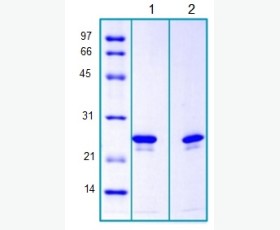Recombinant Human NCR3/NKp30/CD337
| Product name: | Recombinant Human NCR3/NKp30/CD337 |
| Source: | Human Cells |
| Purity: | Greater than 95% as determined by reducing SDS-PAGE. |
| Buffer Formulation: | Lyophilized from a 0.2 μm filtered solution of 20mM PB, 150mM NaCl, pH 7.2. |
| Applications: | Applications:SDS-PAGE; WB; ELISA; IP. |
| Storage: | Avoid repeated freeze/thaw cycles. Store at 2-8 oC for one month. Aliquot and store at -80 oC for 12 months. |
| UOM: | 100ug/50ug/200ug/1mg/1g |
| Source | Human Cells |
| Description | Recombinant Human Natural Cytotoxicity Triggering Receptor 3 is produced by our Mammalian expression system and the target gene encoding Leu19-Thr138 is expressed with a 6His tag at the C-terminus. |
| Names | NCR3 Protein; Natural Cytotoxicity Triggering Receptor 3; Natural Cytotoxicity Triggering Receptor 3 Isoform CRA_c; NCR3 |
| Accession # | O14931 |
| Formulation | Lyophilized from a 0.2 μm filtered solution of 20mM PB, 150mM NaCl, pH 7.2. |
| Shipping |
The product is shipped at ambient temperature. |
| Reconstitution |
Always centrifuge tubes before opening. Do not mix by vortex or pipetting. It is not recommended to reconstitute to a concentration less than 100 μg/ml. Dissolve the lyophilized protein in ddH2O. Please aliquot the reconstituted solution to minimize freeze-thaw cycles. |
| Storage |
Lyophilized protein should be stored at < -20°C, though stable at room temperature for 3 weeks. Reconstituted protein solution can be stored at 4-7°C for 2-7 days. Aliquots of reconstituted samples are stable at < -20°C for 3 months. |
| Purity |
Greater than 95% as determined by reducing SDS-PAGE. |
| Endotoxin | Less than 0.1 ng/µg (1 IEU/µg) as determined by LAL test. |
| Amino Acid Sequence |
LWVSQPPEIRTLEGSSAFLPCSFNASQGRLAIGSVTWFRDEVVPGKEVRNGTPEFRGRLAPLASS RFLHDHQAELHIRDVRGHDASIYVCRVEVLGLGVGTGNGTRLVVEKEHPQLGAGTVDHHHHHH
|
| Background | Natural Cytotoxicity Triggering Receptor 3 (NCR3) along with NKp44 and NKp46 constitute a group of receptors termed “Natural Cytotoxicity Receptors”. They play a major role in triggering NK-mediated killing of most tumor cells lines. NKp30 is a type I transmembrane protein having a single extracellular V-like immunoglobulin domain. NKp30 is selectively expressed both in resting and activated human NK cells. In addition, NKp30 is also involved in NK-mediated induction of dendritic cell (DC) maturation. It has been demonstrated that NK cell activation signaling specifically induces lytic activity against several tumor cell types and synthesis of new NF-κB dependent proteins during the initiation of cytotoxicity. |














